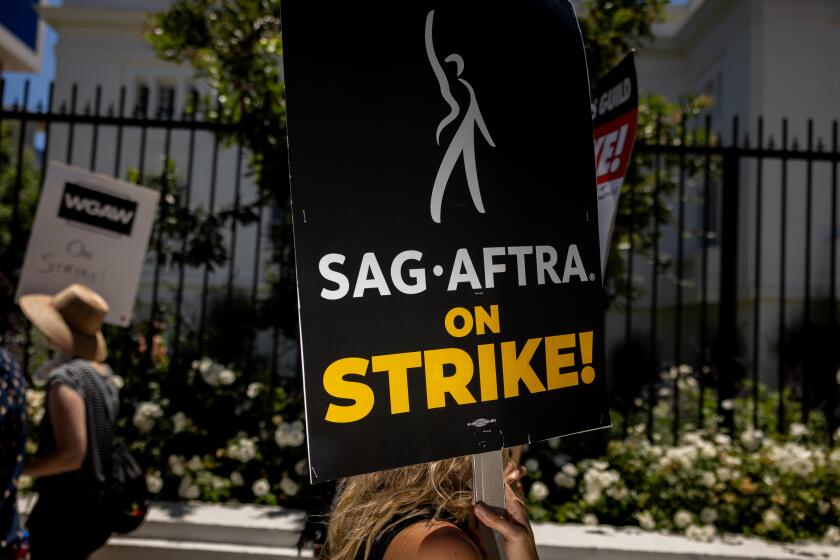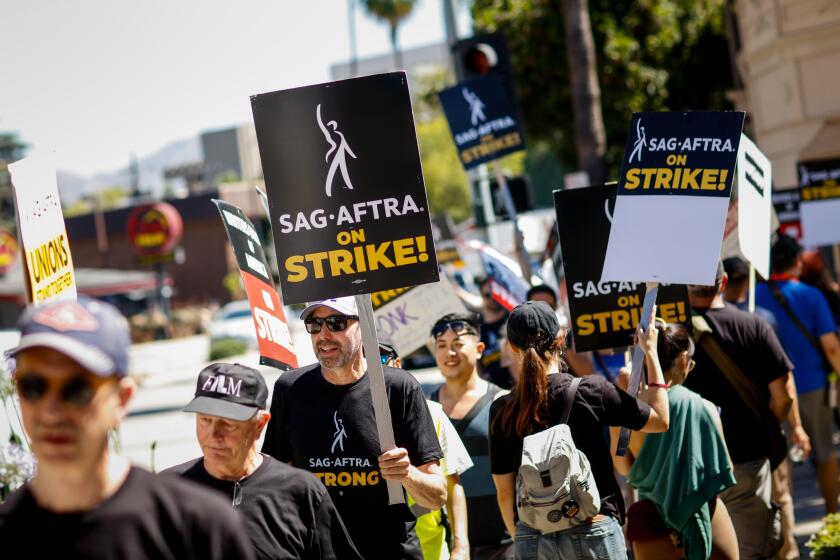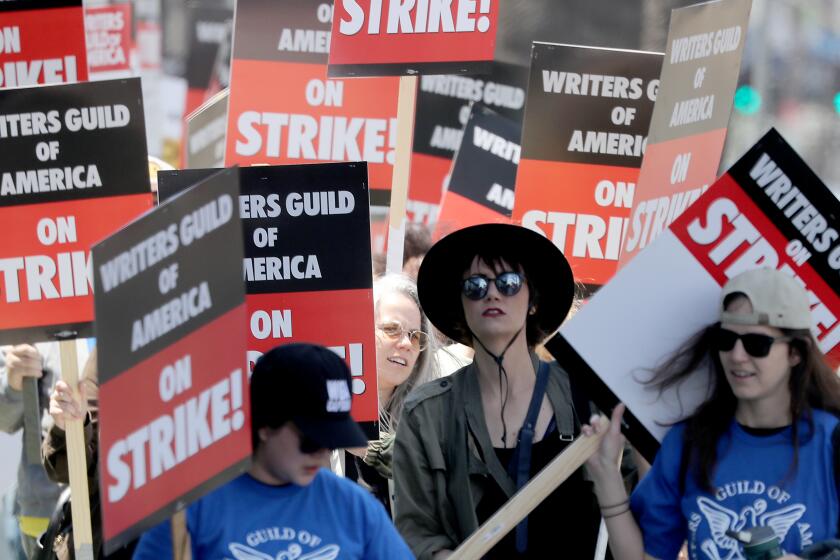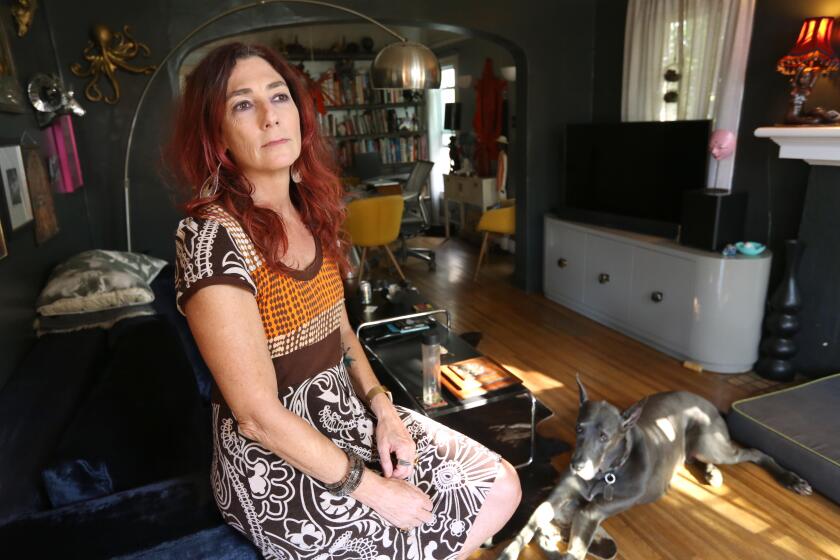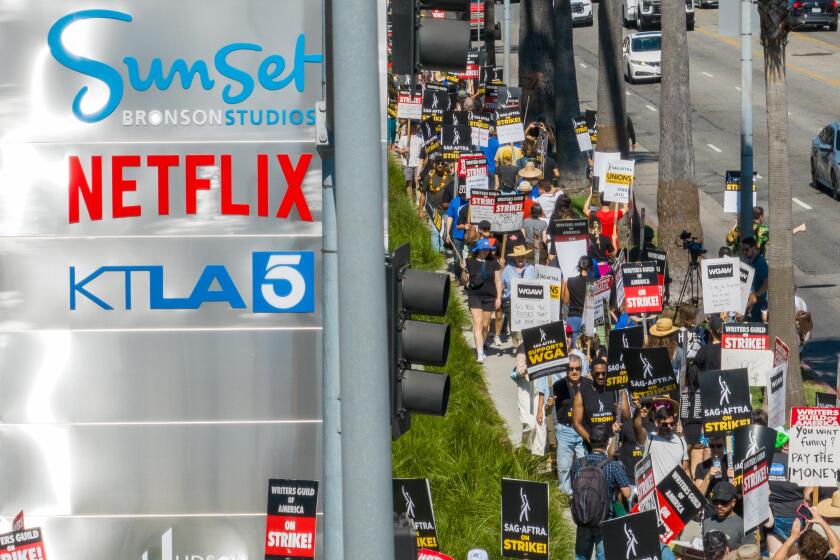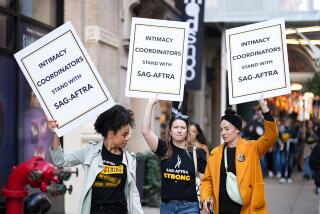Nudity, stunts and cost: Why self-taped auditions are a lightning rod in the actors’ strike

- Share via
When the actors’ union is striking over major issues such as wages, the use of AI and retirement funds, it may seem odd that something like self-taped auditions could be a point of contention. But they are.
Most actors have faced conflicting audition times or the need to cross town to get from one casting appointment to another in the dystopian zoo of Los Angeles traffic. Many have experienced freezing up in an audition room with the camera on and maybe only one chance to get the take right. And, of course, auditioning for some roles was simply impossible if you lived out of town.
For all those reasons and many more, taping your own audition seemed like a great solution for everyone. Casting directors were able to see far more candidates for roles, and from all over the globe.
But a kind of arms race has developed, some striking actors say. Auditioners feel increasing pressure to step up their filmmaking game to compete. SAG-AFTRA, the union that represents Hollywood actors and other performers, says only 5% to 15% of its membership earn enough ($26,470 per year) to meet the threshold to receive health insurance, so any additional expense can prove burdensome, even crippling. More important: Most actors aren’t skilled in cinematic lighting, framing or editing.
SAG-AFTRA has approved a deal from the studios to end its historic strike. The actors were on strike for more than 100 days.
“In the absence of any industry guidelines, the actors are being forced to come up with the rules,” actor-journalist Neal Bledsoe (“Shameless,” “Ugly Betty”) says.
Audition requests may come with the message that professional aesthetics are not expected, he says. “But for artists in a violently competitive industry, that doesn’t address people doing whatever they can to get the job. If there’s an advantage to shooting in 4K, using Lav mics, LED storm lights — they’ll do that. There’s no limit to what they’ll do to get that job. You’ve thrust the burden of production into their lap,” Bledsoe says.
“The advantage of auditioning in the room was forced standardization. Everyone’s on the same camera. You couldn’t hire a coach for hundreds of dollars to read with you and micromanage your performance.”
Actors report that technical demands for self-tapes have increased. Some get shot with multiple angles, even stunts. Some actors feel compelled to pay for services that can help, typically for about $40 for a half hour with all the bells and whistles. One casting office began offering its space for that purpose at $130 an hour. Actors felt they were being required to pay prohibitively large sums for a chance at a job.
“I had a manager who would demand that I film every self-tape with my acting coach, which was $100 per audition,” said one actor-writer on a show who spoke on the condition of anonymity. “Sometimes they wouldn’t like the performance and demand that I do it again. That’s a fairly common ask, actually, if it’s a fairly big audition. That comes from wanting to put my best foot forward, performance-wise — but I’m paying hundreds of dollars for job interviews.”
The actor says she has invested hundreds of dollars in a home setup, but also has had to film tapes while on vacation — only to be berated for quality that was not top-notch. One rep refused to submit her self-tape because her backdrop was wrinkled. “There’s definitely an expectation that it be studio quality,” she says. “There’s this promise that you’re going to earn it all back because one day, you’ll land a series regular role. But as we’re seeing, even those folks can’t pay their bills.”
As SAG-AFTRA members join writers on picket lines, the fallout will disrupt Hollywood film and TV productions worldwide. ‘There’s going to be blood in the water,’ said one analyst. ‘This will not end well.’
The union acknowledges that self-tapes are here to stay and actively embraces them, in many cases. Lead negotiator Duncan Crabtree-Ireland told IndieWire that self-tapes “can be a real advantage to our members in terms of access, accessibility and opportunities for underrepresented groups,” but that regulations are needed to prevent “abusive practices.”
SAG-AFTRA posted an informational chart on its site July 17 to explain its positions, including on “casting and self-taped auditions.” The union objects to online casting platforms requiring fees for their use: “Performers should not be required to pay for access to employment opportunities, nor provided preferential treatment in exchange for fees to a casting platform.” The chart accuses the Alliance of Motion Picture and Television Producers of “shirking” responsibility for the use of these platforms and not offering an alternative to or enforcement of rules that would prohibit “requiring many performers to pay for access to jobs.”
The union says it wants to “alleviate some of the burden and costs of casting that have shifted to members,” such as establishing “a minimum turnaround time … excluding weekends and holidays,” requiring notification if a “role has already been cast at the time self-taped auditions are requested” (sparing actors the time, energy and often money involved in trying out for a job that has already been filled) and limiting how many pages can be required to be shot for a first-round audition.
The union says AMPTP countered by agreeing in principle to some requests but only on “the honor system,” with no enforcement mechanism in place. The union also states that AMPTP “refused to exclude weekends and holidays” from turnaround time, “rejected disclosing when an offer is out … [requiring] performers to contact production to ask if a role has already been cast. They will only ‘endeavor’ to respond,” and “countered with an unacceptable number of pages.”
The 2023 writers’ strike is over after the Writers Guild of America and the Alliance of Motion Picture and Television Producers reached a deal.
Actor-writer Louie Rinaldi (“We Need to Talk About Kevin,” “A.P.B.”) has run into a slew of obstacles while self-taping, some even dangerous.
“The role was something like ‘Sweat Mopper’ — it was for something with basketball,” they say of an audition requiring a pratfall. “It had extensive notes about how physically we were to perform. They wanted more than one take. They wanted the full fall in one take, so I couldn’t cut it to safely fall on the floor. My resume doesn’t say I’m a stunt coordinator or anything. They wanted me to hold a real broom and they wanted to see the floor — it couldn’t be a carpeted floor — so they could see my footwork. They wanted a pratfall, then to barrel-roll, land on all fours, ‘in a cool style if you can.’ I’m just trying to survive — then to mop the floor while you’re on all fours.”
For one film, Rinaldi’s agent got a direct request for them to self-tape some intimate scenes.
“They asked if I was OK to be nude in the film, but also in the tape, if I would show as much nudity as was comfortable. They said, ‘It’s up to you, but we want an actor who’s very comfortable to show nudity. We’d strongly prefer or request the actors to do that.’ All of this was sent from an agent. I felt uncomfortable. I felt this wasn’t allowed. Who’s receiving this?”
Rinaldi declined to disrobe for the video. But they say that requests for extremely short turnaround time — “even less than two hours,” they say — are common.
Workers in film and TV, most of whom are pro-union, have been trying to make ends meet amid a dual strike of Hollywood actors and writers.
“I’ve been asked to turn around tapes in an hour: ‘If you can get it in sooner, that would be best.’ So, the higher chance it will be seen. It feels like there’s no respect for my life or livelihood outside of sending in self-tapes. When it’s multiple scenes and a dance, ‘Sing an original song’ — that requires a lot of effort, to sit down with music, hire an accompanist, learn choreography — anything under 24 hours feels disrespectful. They’ll write it in all caps: ‘GET IT IN AS SOON AS POSSIBLE.’ ”
AMPTP tentatively agreed to union contract demands regarding “limitations on technical requirements,” “slate requirements” (how actors introduce themselves on camera), not requiring nudity or stunts in self-tapes, providing music and choreography for dancers rather than requiring them to come up with their own choreography and securely storing self-taped auditions.
One key request from the actors’ union was that “performers must be provided with an opportunity to audition in person or virtually in lieu of a self-tape on request.” The studios countered, offering that a “first-come, first-served” window would be provided, but that this option “would sunset at the expiration of the three-year contract term.”
Inspired by the success of Netflix, Hollywood studios pursued Silicon Valley-style hypergrowth with tactics borrowed from the likes of Uber and Lyft.
“No one is talking about getting rid of self-tapes. They’re just saying that if you’re the kind of performer who benefits from being in person, that you have that” option, says Bledsoe. “If this is a conversation about access and affording equal opportunity to access, there are some actors — especially older actors — who aren’t as comfortable with technology.”
Bledsoe says he much prefers human interaction and the chance to ask questions about tone, style and pace.
“The amount of times I’ve gone into a room late and had the CD [casting director] say to me, specifically, ‘A lot of people are making this mistake — maybe do this.’ That’s invaluable,” he says. “Casting this medium remotely is antithetical to the human experience that is acting.”
The AMPTP declined a Times interview request but provided a statement: “The AMPTP offered compromises on or met nearly all of the union’s demands on casting, including guardrails around self-tapes (limits on pages of scripted material, tech requirements, response time, information requested, and specific requests for dancers and stunt performers), options for virtual and in-person auditions, payment for waiting time during virtual auditions, and accommodations to performers with disabilities.”
For the basics of self-taping, see the video below, which includes technical information and some listing of actual costs.

Want to audition but get freaked out by having to put yourself on tape? Never fear, The Times is here with experts to tell us what you’re doing wrong (and right) with your self-taped auditions!
More to Read
Inside the business of entertainment
The Wide Shot brings you news, analysis and insights on everything from streaming wars to production — and what it all means for the future.
You may occasionally receive promotional content from the Los Angeles Times.
